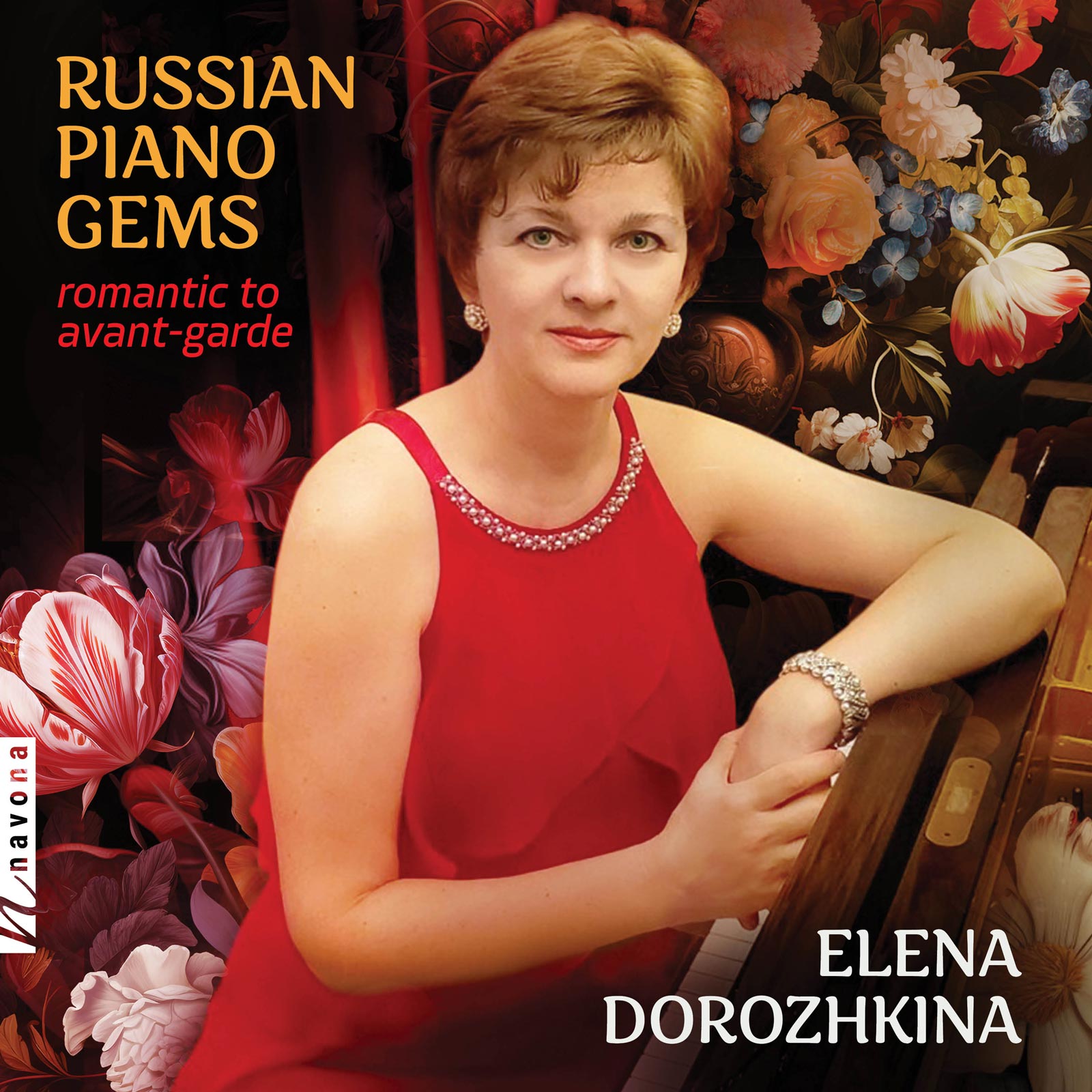Russian Piano Gems
Elena Dorozhkina piano
The Slavic conception of time in music is notoriously generous, exuberant even, often expressed by endless heartfelt melodies, which allude to a “broad yearning Russian soul.” RUSSIAN PIANO GEMS introduces listeners to the rich tapestry of Russian classical piano music with all the emotional grandeur it entails.
Renowned Russian-born, American pianist Elena Dorozhkina brings to life a selection of works by Mosolov, Glinka, Scriabin, Tchaikovsky, and Rachmaninoff with unwavering passion and technical virtuosity. Torrential cascades of thunderous chords alternate with lightning-fast runs, breathless silences intermingle with sweet vulnerability, exaltation and loss are but a hair’s breadth apart. The playing time of these individual pieces might not seem very Russian, but their emotional depth certainly is.
Listen
Stream/Buy
Choose your platform
A fascinating recital ... Dorozhkina is a pianist I for one would like to encounter again.
Her debut disc reveals a remarkable talent ... a thoroughly successful and musically satisfying debut on disc.
Dorozhkina has a lovely expressive gift that allows her to find an intimate connection with the listener in every piece ...
Track Listing & Credits
| # | Title | Composer | Performer | |
|---|---|---|---|---|
| 01 | Sonata No. 4, Op. 11 (1925) | Alexander Mosolov | Elena Dorozhkina, piano | 10:37 |
| 02 | The Lark, piano transcription of a song (1864) | Mikhail Glinka, Miliy Balakirev | Elena Dorozhkina, piano | 6:11 |
| 03 | Etude, Op. 65 No. 3 (1912) | Alexander Scriabin | Elena Dorozhkina, piano | 2:12 |
| 04 | Prelude for Left Hand, C-sharp Minor, Op. 9 No.1 (1894) | Alexander Scriabin | Elena Dorozhkina, piano | 3:05 |
| 05 | Etude in C-sharp Minor, Op. 42 No. 5 (1903) | Alexander Scriabin | Elena Dorozhkina, piano | 3:32 |
| 06 | Dumka (Rumination) “Russian Rustic Scene”, Op. 59 (1886) | Pyotr Tchaikovsky | Elena Dorozhkina, piano | 8:56 |
| 07 | Morceau de fantaisie (Fantasy Piece) in G Minor (1899) | Sergei Rachmaninov | Elena Dorozhkina, piano | 1:01 |
| 08 | Prelude in G-sharp Minor, Op. 32 No. 12 (1910) | Sergei Rachmaninov | Elena Dorozhkina, piano | 2:50 |
| 09 | Elegie Op. 3 No. 1 in E-flat Minor from “Morceaux de fantaisie” (Fantasy Pieces) (1892) | Sergei Rachmaninov | Elena Dorozhkina, piano | 6:16 |
| 10 | Prelude in C Minor, op. 23 No. 7 (1901-1903) | Sergei Rachmaninov | Elena Dorozhkina, piano | 2:45 |
Recorded November 9, 2022 at Allgood Media Services in Atlanta GA
Recording Session Producer and Engineer William Allgood
Mastering William Allgood
Additional Mastering Melanie Montgomery
Instrument and Piano Technician Gabriel Granitz
Steinway 9’ Concert Grand Piano, renovated by Gabriel Granitz
Liner Notes Elena V. Dorozhkina
Edited by Ellis Loyd, David D’Ambrosio, Karen Steinberg
Cover Photo Natalia Shmelva
Photo Editing Dasha Wagner
Executive Producer Bob Lord
A&R Director Brandon MacNeil
A&R Danielle Sullivan
VP of Production Jan Košulič
Audio Director Lucas Paquette
VP, Design & Marketing Brett Picknell
Art Director Ryan Harrison
Design Edward A. Fleming
Publicity Kacie Brown
Artist Information

Elena Dorozhkina
Russian-born, American pianist Elena Dorozhkina has captivated her audiences with an expressive warm tone, virtuosity, and passion in her playing. Genuinely committed to share emotions conveyed in music, Dorozhkina has performed solo and collaborative recitals at concert halls of the United States, Germany, Czech Republic, Russia, and Ukraine. Dorozhkina’s 2022 Spivey Hall solo and collaborative recital performance was broadcast on The Atlanta Music Scene, WABE FM 90.1 radio.
Notes
I believe classical music has a unique power to change a human’s soul to a more loving and compassionate one. Thus, I feel that my mission, as a piano performer, is to share the incredible art of the world’s classical music with people.
I have a special feeling for the music I included in this album. One may call it self-identification. Perhaps because I am Russian-born and received my initial music training from a world-famous Russian conservatory, this music is embedded in my DNA. It speaks deeply to my soul and I can feel the emotions conveyed in the pieces. I hope that through this music, I can express these emotions from my heart to your heart. Thank you for your attention to this beautiful music and my interpretation!
— Elena Dorozhkina

